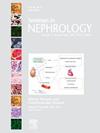求助PDF
{"title":"Beyond Kidney Genes: Broad Clinical Implications of Genetic Testing for Nephrology Patients.","authors":"Naama Elefant, Maddalena Marasà, Hila Milo Rasouly","doi":"10.1016/j.semnephrol.2025.151660","DOIUrl":null,"url":null,"abstract":"<p><p>Genetic testing in nephrology is evolving beyond diagnosis of kidney diseases to significantly influence broader patient care. This review evaluates the expanding role of genetic information in nephrology practice. We compare various testing technologies-including targeted gene panels, exome/genome sequencing, and single nucleotide polymorphism (SNP) arrays-highlighting their clinical utility and limitations in various medical specialties. We discuss existing tests where genetic results could impact the care of patients with chronic kidney disease (CKD): management of CKD-associated comorbidities, clinical implications of American Society of Medical Genetics and Genomics actionable genes, pharmacogenomic tests to optimize medication selection and dosing, and Human Leukocyte Antigen testing. As novel genetic tools emerge, such as polygenic risk scores and clonal hematopoiesis of indeterminate potential, we discuss how they may soon be reported in clinical settings. Given the complexity of interpreting diverse genetic data, we advocate for the integration of genetics professionals into nephrology care teams. This review concludes that genetic testing beyond kidney-specific genes holds immense promise for improving the care of patients with kidney diseases, but further research is necessary to establish guidelines for its integration into nephrology practice. Semin Nephrol 36:x-xx © 20XX Elsevier Inc. All rights reserved.</p>","PeriodicalId":21756,"journal":{"name":"Seminars in nephrology","volume":" ","pages":"151660"},"PeriodicalIF":3.5000,"publicationDate":"2025-07-01","publicationTypes":"Journal Article","fieldsOfStudy":null,"isOpenAccess":false,"openAccessPdf":"","citationCount":"0","resultStr":null,"platform":"Semanticscholar","paperid":null,"PeriodicalName":"Seminars in nephrology","FirstCategoryId":"3","ListUrlMain":"https://doi.org/10.1016/j.semnephrol.2025.151660","RegionNum":3,"RegionCategory":"医学","ArticlePicture":[],"TitleCN":null,"AbstractTextCN":null,"PMCID":null,"EPubDate":"2025/7/17 0:00:00","PubModel":"Epub","JCR":"Q2","JCRName":"UROLOGY & NEPHROLOGY","Score":null,"Total":0}
引用次数: 0
引用
批量引用
Abstract
Genetic testing in nephrology is evolving beyond diagnosis of kidney diseases to significantly influence broader patient care. This review evaluates the expanding role of genetic information in nephrology practice. We compare various testing technologies-including targeted gene panels, exome/genome sequencing, and single nucleotide polymorphism (SNP) arrays-highlighting their clinical utility and limitations in various medical specialties. We discuss existing tests where genetic results could impact the care of patients with chronic kidney disease (CKD): management of CKD-associated comorbidities, clinical implications of American Society of Medical Genetics and Genomics actionable genes, pharmacogenomic tests to optimize medication selection and dosing, and Human Leukocyte Antigen testing. As novel genetic tools emerge, such as polygenic risk scores and clonal hematopoiesis of indeterminate potential, we discuss how they may soon be reported in clinical settings. Given the complexity of interpreting diverse genetic data, we advocate for the integration of genetics professionals into nephrology care teams. This review concludes that genetic testing beyond kidney-specific genes holds immense promise for improving the care of patients with kidney diseases, but further research is necessary to establish guidelines for its integration into nephrology practice. Semin Nephrol 36:x-xx © 20XX Elsevier Inc. All rights reserved.
超越肾脏基因:肾脏病患者基因检测的广泛临床意义。
肾脏病学中的基因检测正在发展超越肾脏疾病的诊断,以显着影响更广泛的患者护理。本文综述了遗传信息在肾脏病学实践中日益扩大的作用。我们比较了各种检测技术——包括靶向基因面板、外显子组/基因组测序和单核苷酸多态性(SNP)阵列——强调了它们在不同医学专业的临床应用和局限性。我们讨论了遗传结果可能影响慢性肾脏疾病(CKD)患者护理的现有测试:CKD相关合并症的管理,美国医学遗传学和基因组学学会可操作基因的临床意义,优化药物选择和剂量的药物基因组学测试,以及人类白细胞抗原测试。随着新的遗传工具的出现,如多基因风险评分和潜力不确定的克隆造血,我们讨论了如何在临床环境中很快报告它们。鉴于解释各种遗传数据的复杂性,我们提倡将遗传学专业人员整合到肾脏病护理团队中。这篇综述的结论是,除肾脏特异性基因外的基因检测对改善肾脏疾病患者的护理具有巨大的希望,但需要进一步的研究来建立将其纳入肾脏病学实践的指导方针。Semin Nephrol 36:x-xx©20XX Elsevier Inc.。版权所有。
本文章由计算机程序翻译,如有差异,请以英文原文为准。

 求助内容:
求助内容: 应助结果提醒方式:
应助结果提醒方式:


